Full Disclosure: ScreenAnarchy's Lists of Shame - February (Part 2)
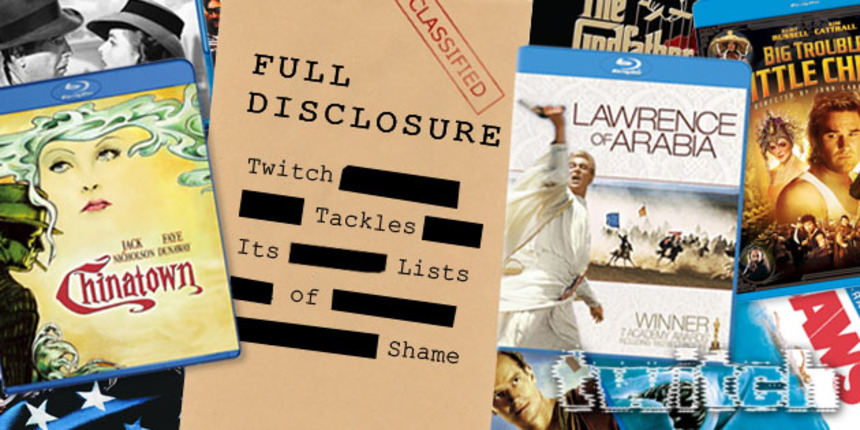

Cinderella (dir. Clyde Geronimi/Wilfred Jackson/Hamilton Luske, 1950 USA)
Winner of Golden Bear for Best Musical at Berlin International Film Festival, Nominated for 3 Academy Awards, including Best Original Score
First, a brief bit of personal biography before I talk about why I found Cinderella to be a chore to sit through. Before she married my wonderful stepdad, as a single mother, my mom worked an almost obscene amount to keep us in a home and clothes, meaning that a VCR wasn't a luxury we could afford during my formative years. It was only after my little brother was born when I was 17 that I saw any Disney animated films made before 1985 (that would be The Aristocats). It was maybe in the mid-to-late 90's that I really started paying attention to Disney films (again, a little brother meant making the choice between The Lion King or wearing out one of his Barney tapes). At the time I took it for granted - based on their legacy - that the pre-80s stuff was some kind of treasure trove of brilliant, culturally-defining animation.
Cinderella wasn't one of those films.
After a promising start introducing us to its title character, Cinderella does a lot of cocking around with her little animal pals (for something like 20 interminable minutes) before the actual story kicks in, and we're away to the races with more fuzzy animal shenanigans, some lovely animation for our heroine with a porcelain doll's lack of facial detail (at least when compared to the rest of the characters), and worse, some nonsense about how if you're good enough, and nice enough, the world will magically give you everything you want. Cinderella feels broken up between an extended short about fuzzy animal adventures leading into a quick fairy tale feature about a dull princess, roll credits. There's nothing to it, the whole thing feels so mercenary, pulled from the rough outlines of an idea into a rough feature whose only characters with definition are the wicked stepmother and sisters.
Maybe Disney and company were doing some next-level storytelling, where the complete emptiness of the heroine would allow all the little girls in the audience to fill out their own details and identify with the would-be princess in their own way. Maybe, the good princess is you. I have no idea, but honestly struggle to recall a single detail about the character (she's blonde, I think), but her evil step-family were kind of a hoot and I wish there'd been more of them.
This hasn't completely put me off exploring pre-80s Disney: I'm still going to seek out what I've heard is the far-superior Sleeping Beauty, but for anyone else out there looking to discover why the studio was once a powerhouse of traditional animation, look elsewhere.
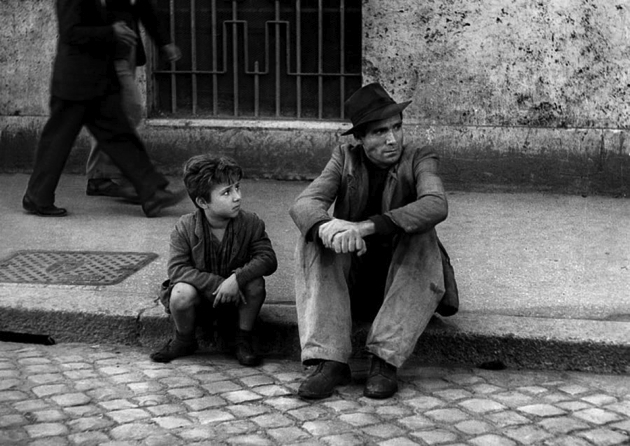
Bicycle Thieves (dir. Vittorio de Sica, 1948 Italy)
Winner of honorary Academy Award as Best Foreign Language Film of the Year, BAFTA for Best Film from any Source
Vittorio De Sica's masterpiece has routinely made and topped Best Films Of All Time lists with such a wide variety of critics and industry professionals that I am a little ashamed never to have seen it. Having corrected that error I am still ashamed but let me explain. Bicycle Thieves takes place in postwar-decimated Rome, picking up the story of Antonio Ricci, a dejected father and husband who finally lands a solid job only to have his much needed bicycle stolen. Marching off with his young son Bruno in tow, Antonio becomes increasingly desperate, uncertain of his future and unable to contain the despair that grows within him.
I was left with a sense of urgency. What can be done in such a situation?! All through the film we see Antonio wrestle with what is right and wrong in his situation as he is also haunted by one practical reality - if he does not find his bicycle he will lose his new job and any hope of providing for his family. What else is there to make of his situation? He is surrounded by men just like himself, institutions that are overrun with those needing help. His increasing frustration causes him to lash out at those whom he loves most, to lose his reason and his own ability to maintain hope.
If I was somewhat ashamed not to have seen this film, I am ashamed now that I have never screened it for others as I live and work in a commune dedicated to serving the needs of the poor. I am ashamed that having seen it I find myself a sinner, useless, a man no better than Antonio or even the thief. I am a man of no answers to Antonio's plight, to his fate and I am ashamed to live in a country with an ever-growing number of Antonios who not only need the material help of our organization but a sense of hope that - and perhaps this is my biggest shame - that I, with all my first world problems, often don't have for myself.
I don't think De Sica's intent was to shame viewers. Though I haven't studied the Neorealist film movement (look it up, I don't have the space here) I get a sense that he is first and foremost interested in presenting to us as honest a picture of Antonio and postwar Rome as he can with his camera and crew. Through it we end up in Antonio's shoes, we feel what he feels. It's a precious and hopefully lasting empathy that suffused me in the days that have followed my screening. I wish it for you as well. There is all of humanity here, waiting, needing not to lose the one thing that matters most.
Bicycle Thieves made my list because it was a movie even my film-illiterate parents had seen. Usually they're all, "Have you seen The Avengers/Iron Man/Spider-man yet?" but this one time they surprised me with, "Have you seen the one where the I-talian guy gets his bike stolen? What's that one called? The Bike Taker-Awayer?" It pained me to say I hadn't, because I generally like to lord my superior film knowledge over my family. So I decided this was a gap in my viewing history that needed to be filled, like a hungry stomach with spaghetti.
I imagine the ideal way to watch this film at home would be on Criterion Blu-ray, but I had to settle for the inferior Image Entertainment release on Netflix streaming. (I love it when foreign films have selective subtitles. You don't need to know everything the characters say, just the important bits! Good thing Italians speak with their hands.) Still, it didn't detract from the viewing experience. This heartfelt story about doing whatever it takes to provide for your family touched the garlicky Italian half of my heart. The other half, cognizant of the stereotypes on display, was not so kind. What kind of dad let's his 7-year-old work 12-hour days at a gas station? Or tells him, "Let's forget everything and get drunk?" An Italian one, that's what kind.
I like how the film has an almost classic Hollywood feel and doesn't come off as overtly European. I guess that accounts for its widespread appeal. It's an accessible foreign film, one the whole family can enjoy. The end is pretty devastating, but not in that shit-wallowing way so many modern films are. It's all there in the sins of the father, and the eyes of young Bruno, the 7-year-old alcoholic gas station attendant. It's a timeless lesson we all must learn, and Bicycle Thieves portrays it with perfect simplicity.
So far I'm two for two with my list. My shame is turning out to be my gain. Oh, and your move, Mom and Dad. Your move.
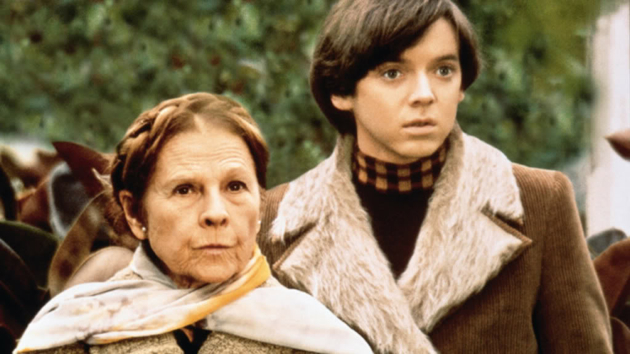
Harold and Maude (dir. Hal Ashby, 1971 USA)
Nominated for 2 Golden Globes, Best Actor and Best Actress in a Musical or Comedy
As with most on my list of shame, this choice was prompted by admiration of the director's other work and a desire to fill in the blanks. I caught Hal Ashby's The Last Detail (1973) by accident when I was a teenager with rebellion on my mind (where, thankfully for my parents, most of it remained) and loved every second. Jack Nicholson's Buddusky was just about the coolest thing; brazen, hard-drinking and cynical. Even if he did wear a silly hat. The director's acerbic but sensitive approach also appealed, and I have a soft spot for those downbeat endings of New Hollywood. Harold and Maude has a tremendous reputation; not a canonical work in the classic sense, but a much-loved favourite for many who've seen it. I knew precious little going in - something about an old lady and a young guy getting together?
Like The Last Detail, this movie rails against convention and is infused with the same rebellious spirit and satirical edge. Only, Ashby is in a far more whimsical mode here. It's a comedy about young and old, that patronizes neither. It manages to be a touching yet completely unsentimental look at cross-generational kindred spirits, and far funnier than I imagined.
The mock suicides the vampiric looking Harold stages for his aloof mother's benefit ("No, I would not say 'benefit' ") are superbly handled. The opening Cat Stevens - backed 'hanging' is a masterful stroke of black comic cinema that sets the tone of what's to come. As with The Graduate (1967), this is really just a guy trying to find his way in the world, hampered by a fog of phoney adults, lazily pressing for a conformity that mimics their own ideology. In Maude he finds the unlikely exception. Harold's obsession with death counters the boredom of a charmed life and though his behaviour is unusual, it's also witty and an entirely fitting response. What's more, he's likeable too. So when he breaks the fourth wall with a knowing to-camera grin, I was with him all the way, complicit in those mischievous performances.
Harold and Maude is a romance of spirit and attitude; soulful and truly sublime.
My first introduction to Ruth Gordon was in the memoirs of Timothy Findley. In his younger years, he was an actor on tour in a production of Thorton Wilder's The Matchmaker with Gordon. It was she who encouraged him to switch careers, and on his first short story publication, he burst into her dressing room with the magazine when Gordon was half naked. While initially angry, upon learning the news, she told him the next time he was published, she hoped she would be stark naked. This kind of wry sense of humour and love of life was a perfect anecdote of Gordon. While mainly a theatre actor for her long life, her two best-known film roles are from her older years: Rosemary's Baby, and a few years later, Harold and Maude. For some reason, the latter took me until this month to see, and I don't know how I ever lived without it. I might even put it in my top ten movies of all time. Darkness, light, love, death, heartache and happiness: it is the epitome of all these dichotomies of life, anchored by Gordon's incredible performance.
I knew going in that this was about the relationship between a teenage boy and an elderly woman, which is probably the main reason I wanted to see it. I've recently banned any and all films that involve relationships between a man and a woman when the man is more than 15 years older than the woman and the age difference is accepted without question. This has been an issue in film for a long time; yet an older woman and younger man are rarely seen together, or if they are, the age difference is an important part of the narrative.
I would like to think that an age difference as large as in this film would be a point of interest even if the genders were reversed. And of course in this film the age difference is extremely important, but what I loved was how the director, script, and actors made the connection between Harold and Maude so effortless, so natural, that it didn't occur to me that they shouldn't be together however they wanted. I have only seen one other Hal Ashby film, Being There; these two films would make for an amazing double bill. Both are about strange people trying to find ways of operating in a world that shuns the strange, discovering love and sex that is considered taboo, and yet never shying away from it. It made me cry. It gave me hope. It made me mad that Gordon isn't around anymore. Harold and Maude, unlike so many of today's rom-com-dramas, is truly a timeless classic.
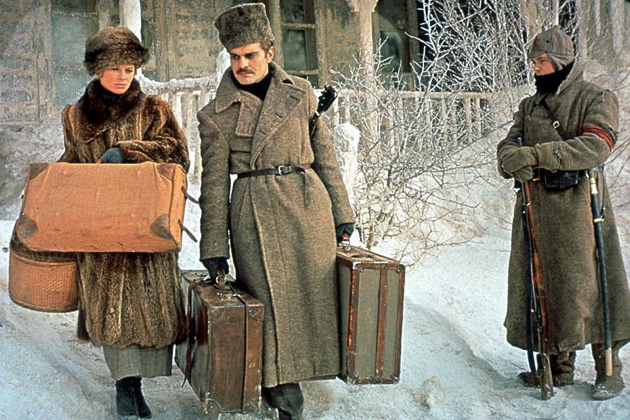
Doctor Zhivago (dir. David Lean, 1965 USA)
Winner of 5 Academy Awards, including Best Adapted Screenplay and Best Cinematography, Winner of 5 Golden Globes, including Best Picture - Drama and Best Actor in a Drama
For many who were around for its original release, Doctor Zhivago was the definitive David Lean film, a mix of the exotic, operatic and romantic. As someone who adores Kwai and considers Lawrence easily one of the best, most perfect films ever made, I was always trepidacious to tackle the Bolt/Young/Lean follow-up. I owned the DVD since its first release a dozen years ago, sold a sealed copy to buy it on Blu, and then had it sit on my shelf for over a year. It was the one film I knew had to make my ScreenAnarchy list, just to get the damn thing out of the way.
Finally watching it, I was struck by how much the film helps link Lawrence to Lean's final work, A Passage to India. For me, Passage always played as pretty but light entertainment, Lawrence as modern, political and majestic. Zhivago sits very much in the middle, its rich politics and exoticism diminishing slightly with age, while Lawrence's have increased over time.
It's easy to see Lawrence and Zhivago as brothers-in-arms, each tackling a similar time period of the early twentieth century, focusing on what amounts to internecine civil conflict and revolutionary fervour. For a mid cold-war audience, Zhivago's frigid setting would have been revelatory, but I think that modern audiences have long grown accustomed to the mysteries behind the Iron Curtain. Similarly, the complexity of the sexual relationships, long a staple of Russian literature, now seems more predictable than scandalous (it is, after all, a convenient way to stay warm).
The performances are fine, with the particularly bold decision to cast Sharif (following O'Toole's refusal to join the troupe) still quite compelling a half century later. I was struck by Freddie Young's Arabian quirks finding their way into frozen Russian landscapes, and was often distracted by just how much, both in terms of performance and composition, the angelic face of Julie Christie reminded me of El Aurens (for proof, a slightly cheeky visual guide demonstrating this can be found here).
The film's pace is brisk enough, its staging of horse battles and Arctic-like landscapes often quite wonderful. Still, it feels a little like a retread, old-fashioned in a way that's entirely absent in both Lawrence and Kwai.
The deserts of Arabia and the jungles of Burma/Siam still hold a kind of raw exoticism for this Canadian, at least more so than even the most visually resplendent ice palace. Most importantly, while both Kwai and Lawrence toyed with historical fact, they were films based on astonishing real-life tales, providing an ineffable richness lacking the more formal, literary Zhivago.
As a cap to a remarkable trio of films, Lean's Russian epic is well worth seeing. Fair comparison or no, in the end it's a far cry from the astonishingly modern and vital earlier works to which Doctor Zhivago's melodramatic tale is inexorably linked.
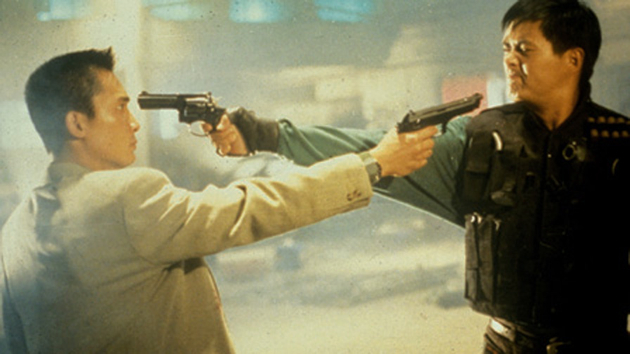
Hard Boiled (dir. John Woo, 1992 Hong Kong)
Winner of Best Editing at Hong Kong Film Awards, nominated for Best Supporting Actor
I have seen John Woo's films before and loved them, particularly Face/Off. Yet I have never seen his classic Hong Kong fare. I regret this decision as I am a fan of both action cinema and Asian film. Basically, there is no logical reason why this is on my List of Shame, but here we are. So what to say about Hard Boiled? Well, I recommend this film to anyone with a passing interest in action as it sets a shattering precedent that remains unmatched today.
Of course Woo's style is legendary but Hard Boiled is something else entirely, by not relying on his consistency of approach such as slow motion or grandiose shots. This is, after all, a hard boiled affair. We get cops and baddies screwing up their faces and lunging into each other amidst a shower of bullets and bodies; a simple concept that is taken to extraordinary heights of skill and direction.
Contempory directors of Hong Kong cinema dabbling in action, like Dante Lam, barely skim the surface of the full blown operatic and near-perfect scale of chaos and unforgiving violence in Hard Boiled. Violence is trendy, and killing a man is akin to taking a breath, you feel a lot less inclined to argue against the proliferation of death on screen as Woo effortlessly parades it for our enjoyment.
Practically, there are three major set pieces that never seem to end; Woo ensures the innocent and the guilty are caught in a violent nightmare loop of bloodshed and gunfire, and this is perfectly acceptable. Chow Yun Fat hardly seems to be trying as he takes down the scum of the city and his unlikely partner, played by Tony Leung, makes for great and simple chemistry.
I lost count of the number of times my jaw hit the floor, while the choreography of gunplay reaches sublime levels. Hard Boiled is absolute entertainment that I cannot wait to experience again.
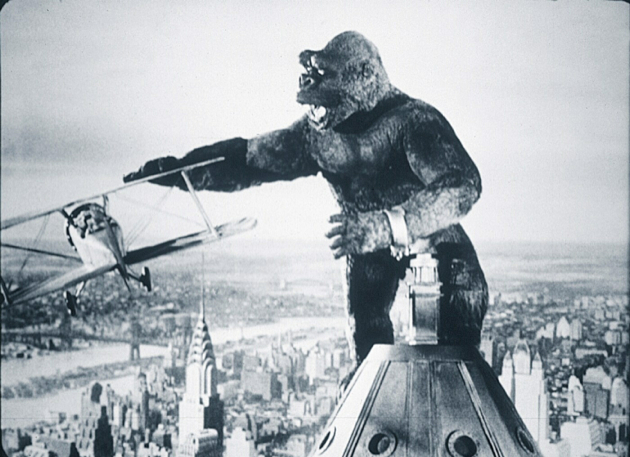
King Kong (dir. Merian C. Cooper/Ernest B. Schoedsack, 1933 USA)
Not that I'd call myself an immense Kaiju fan, but there is something strangely satisfying about seeing a man in a rubber suit about to trash a model city. While most films spend all their time and budget on setting up a bubble of make-believe, these giant monster films break right through that bubble and offer you a hour and a half of tongue-in-cheek fun instead. With that in mind, I was actually looking forward to seeing the film that started the trend.
What surprised me the most about King Kong is the film's agreeable pacing. Cooper and Schoedsack don't waste much time, jumping from setting to setting, diving as quickly into the action as possible. Not that Kong himself is introduced right away, but every scene before his grand appearance has a clear function and builds up the adventurous setting quite well. Maybe it's because I had already seen Jackson's rather drawn-out version of the saga, but this was actually quite a relief.
The effects of the film have aged considerably, but having a soft spot for stop-motion animation this hardly bothered me. The camera work is remarkably solid (I did watch the remastered version though) and the soundtrack, although quite present, didn't bother me as much as I had thought it would. The action is fun and abundant and the ending shines in all its iconic glory.
One other scene in particular stood out though. The first encounter with a dinosaur was pretty shocking for someone who belongs to the Jurassic Park generation. Instead of showing awe and wonder, this group of sailors just mowed that sucker down without any sign of remorse. They even gave it an extra neck shot before they went on to look for Kong, as if discovering an age-old living relic was something that had happened to them before.
King Kong is a film that works as long as you appreciate the cute charm of old monster movies. Seeing it listed in horror best-of lists is kinda weird (though I'm sure people looked at it a lot differently when it was first released), but luckily there is still plenty to enjoy beyond the rubbery gruesomeness of Kong. The film turned out to be a rather pleasant surprise and far exceeded my expectations. Not a film that I'm likely to revisit anytime soon, but a fun and adventurous ride nonetheless.
I've just finished watching King Kong and my first thought is "What the hell took me so long?" For some reason I had always avoided it, thinking it would be a shoddy b-movie with lousy effects, a strung-together story and second-rate acting. Boy was I wrong.
Clearly, King Kong has had a cataclysmic effect on cinema. I don't think it would be a gross claim to state that most blockbusters which have followed are indebted to it. The gates of Jurassic Park (1993), the ending of The Lost World (1997), the hobbits hiding from the ringwraiths in the forest scene during The Fellowship of the Ring (2001), these elements are not merely inspired by the classic, they are blatantly lifted from it. Would filmmakers like Spielberg and Jackson even be working today if not for King Kong?
For an 80-year old film, and an outlandish monster feature at that, it's pretty extraordinary how well this holds up to modern viewing. Having been recycled or borrowed from so often over the years, seeing it for the first time now held no surprises on a narrative level. What did take me by surprise were its landmark effects, breathless storytelling, the most unexpected of love triangles and its daring ambition. Heightened by an exotic location and the ingenious inclusion of dinosaurs, King Kong is the epitome of adventure but, it's also something more. One man's extraordinary hubris becomes the starting point for a commentary on the nature of spectacle and entertainment. Given what the film sets out to achieve on a commercial level, this is some pretty post-modern stuff and not something I would expect from today's crop of tentpoles.
Truly ahead of its time, King Kong is a dynamite blockbuster with brains. Can we ditch the sequels and remakes and go back to making films like this please?
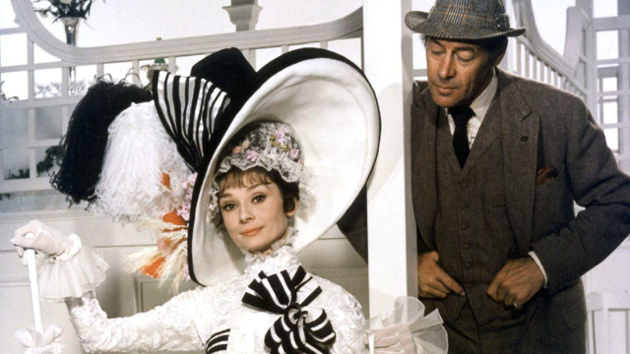
My Fair Lady (dir. George Cukor, 1964 USA)
Winner of 8 Academy Awards, including Best Picture, Best Director and Best Actor
Last month I had to confess that Sunrise was at the top of my personal shame list, and this month it's the reverse: George Cukor's Oscar-winning film version of My Fair Lady (1964) was at the bottom. Why? For the simple reason that I'd tried to get through it on past occasions, and hence was not even that ashamed that it was on my list. Still, with some wonderful songs, two stars I like a lot, not to mention a director who was one of the Golden Age greats - not just The Philadelphia Story (1940), but also Camille (1936), for my money the greatest screen romance ever - I figured it was certainly worth another shot. At the very worst, I figured it would be fascinating for its take on gender roles, something I'm personally interested in.
Well, it is that - interesting from an intellectual perspective - but that's about all. Otherwise, in terms of cinematic pleasure, it was one of the most draining slogs (IMDb clocks it at 170 minutes) that I've endured in recent memory. That's because all of the things that had previously irked me when viewing the first 15 or 20 minutes were pretty much present throughout. These include extreme staginess, questionable editing, poor use of the wide screen, production values that feel like watered-down Minnelli, a lot of strutting about in lieu of actual dancing, and a general air of forced energy. Saddest of all, the musical's most gloriously soaring song, On the Street Where You Live, is shot in mind-numbingly static fashion.
But my litany doesn't end there. The worst aesthetic offender is one I hadn't noticed on previous attempts but became increasingly insufferable as the picture wore on, and that's Audrey Hepburn's lip-synching. I'm not referring to the fact that she doesn't sing her own songs - I can get over that - but that the synching itself is so horrible. She consistently moves her mouth into the appropriate shapes a split-second too soon or too late. Yet should the blame fall with her, or others, for not catching and correcting this when they had a chance? I'm not sure, but more intriguing is the possibility that we simply watch movies differently than we did fifty years ago. The same way that 1950s audiences didn't seem to notice wires on "flying" objects, or that future moviegoers will wonder how on earth we today can stomach crappy CGI (that studios somehow spend millions on), well, they simply didn't see that kind of disconnect between image and sound back then.
So why did this film win the Oscar, which, along with its pedigree and famous songs, probably accounts for its "classic" status? I'm not sure, but then again, the fact that the equally-hard-to-watch Les Miserables has been nominated for a ton of awards, including some for Tom Hooper's direction, is also mystifying. A semblance of spectacle, appealing performers, and some rousing tunes are apparently all that's required.
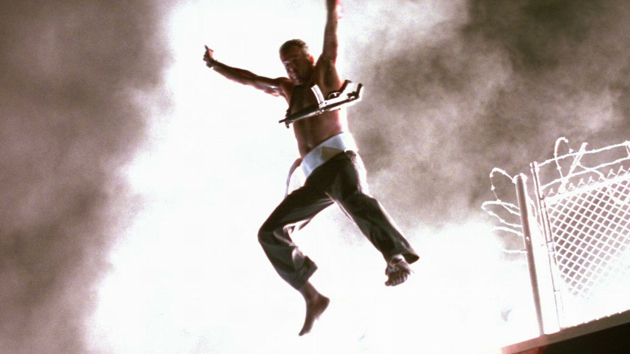
Die Hard (dir. John McTiernan, 1988 USA)
Nominated for 4 Academy Awards, including Best Editing and Best Visual Effects
When Die Hard came out in 1988, I was a child who didn't (generally) care for explosive-laden action movies. At the time, Bruce Willis was still best-known as the sly, totally swoony David Addison on Moonlighting (which I recall watching religiously). Honestly, I have no idea how Die Hard came to be on my List of Shame, and my never having seen it has always been something of a reliably humorous anecdote. I guess, now, I need to find another one.
As much as I hate to admit it, I quite enjoyed Die Hard; mainly because of Willis' confidently suave and easy charm which has, sadly, diminished (much like his hairline) over time. Certainly, the experience of seeing a big-budget film from the era of my formidable youth was both strange and amusing, the glaring anachronisms adding to the overall experience. I mean, could Die Hard even be remade (remakes not withstanding) today? The film's plot is premised on the notion of isolation, which seems absurd now - if at the very least John McClane had Gordon Gecko's brick of an archaic cellphone then Hans Gruber's evil plot would have been totally foiled from the get-go.
I was actually compelled enough by the narrative thrust of the kinetic action sequences (which normally cause my eyes to glaze over) to keep watching. Those scenes were well done and definitely do hold up - I can just imagine legions of kids watching and re-watching the scene (on VHS!) where Gruber blasts a guy's head off. In retrospect, the casting of Bonnie Bedelia (and her perm) as McClane's wife struck me as interesting, if only because her (albeit limited) character was not marginalized or defined by any kind of overt sexuality. She's brassy but not "sexy," which was, oddly, refreshing. That the traditional "girlfriend" or "wife" role has become so commonly, casually sexualized twenty-five years on seems like a step back; I can't imagine Bedelia being cast in that role today, regardless of how much of a feminist ("Ms. Gennaro") her character might have been.
Die Hard is an iconic film and I can now appreciate why, despite my general disdain for the action genre, it is as revered as it is.
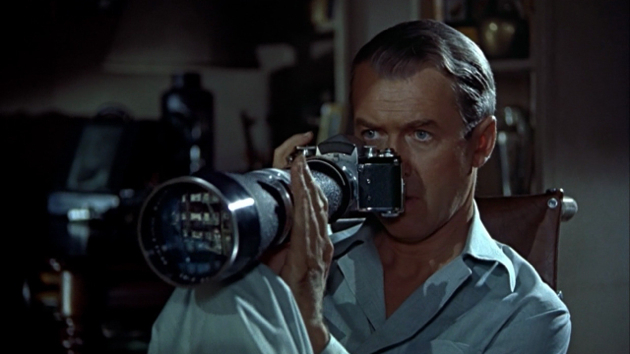
Rear Window (dir. Alfred Hitchcock, 1954 USA)
Nominated for 4 Academy Awards, including Best Director and Best Screenplay
It might be shameful to some to hear but I've only seen three Alfred Hitchcock movies in my life, counting the very film I'm writing about now. The other two are Psycho and The Birds. I've seen bits a pieces of others, Vertigo, Frenzy, North By Northwest to name a few but I can't say I've been itching to try out his other works. Don't know why, I'm just not that interested. I do however have North By Northwest coming up next month so that will be another one off the list.
Before sitting down to watch Rear Window, the closest I've gotten to it was a loose remake in the form of Mimic 3 and assorted parody scenes in The Simpsons and other shows. I knew fairly little about it, aside from the main plot and was pleasantly surprised by how innovative it is.
I love that the whole film is shot in a studio, mostly from the same spot and that the large supporting cast is mainly doing pantomime the whole time. Hitchcock loved to push the technical boundaries of filmmaking at the time and it's great to see him use the long single takes, full of background action, to show the microcosmos that James Stewart is stuck in. I was also surprised at how funny it is with the great supporting cast of Thelma Ritter and Wendell Corey.
As a thriller it´s showing its age, the flash bulb scene is ridiculous and it's only the last few minutes that the film turns into any semblance of a thriller. The rest of the time we think Stewart is on the wrong track, thanks to a red herring thrown our way.
I liked the film over all, it's not terribly exciting but I liked it more for its technical aspects and the incredible details put in there than anything else. Also Grace Kelly, my lord was she beautiful. I'm sure that Rear Window was innovative and exciting at the time but it's not exactly a film that demands repeated viewings other than maybe for the acting, which is for the most part stellar, and the set design. The plot is clear cut as soon as it reveals everything and there's nothing in there that you might have missed the first time around. It's good but not great.

Do you feel this content is inappropriate or infringes upon your rights? Click here to report it, or see our DMCA policy.






